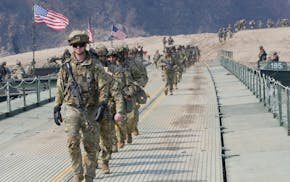Essential Minnesota subscribers got this story first. Subscribe here.
Months ago, my fellow Minnesota Star Tribune editors and I started planning how best to tell the story of what happened on May 25, 2020, in Minneapolis, and what's happening today. Our goal was clear: to bear unflinching witness to that story. George Floyd took his last breath under a police officer's knee right here. In Minnesota. The world watched and cried out for justice, and the outpouring of grief and protest that followed felt like an earthquake had erupted in Minneapolis, sending aftershocks throughout Minnesota, across the country and overseas.
Five years later, we knew this was a story we needed to keep telling, remembering and learning from – no matter how painful or uncomfortable.
Every department contributed to our series "The legacy of George Floyd."The newsroom quickly rallied around one novel idea that would serve as the anchor for our coverage: an oral history of the six days after George Floyd's murder in Minneapolis, in the words of witnesses to those events.
This multimedia story was a massive undertaking, involving more than two dozen journalists and countless hours of interviews, photography from then and now, editing, and design for print and digital. We offer you this immersive story in hopes that it recalls your own experience, reveals new dimensions of those historic, tumultuous days, and forges a path for carrying hard-won lessons into the future.
Since I was a news editor in 2020, I thought I knew everything about the events of that week. But here are five things I learned from the oral history:
Minnesota Attorney General Keith Ellison fielded calls from famous people:
"I started getting other calls. Rev. [Al] Sharpton is a friend of mine, so I'm getting calls from him. I'm getting calls from Jesse Jackson. Van Jones is calling me. He asked me if I'd take a call from Jay-Z. I just said, 'Well, look, you know, we're here to help in any way that we can.' That's what I kept doing. I didn't want to do anything to undermine the governor's options."
Former Minneapolis Police Chief Medaria Arradondo, in his new book, talks about the mayday message that went out the day the Third Precinct burned:
"When the emergency tone goes out over the radio, it pauses all other radio traffic. It's a mayday alert. Wherever they are, officers go silent. Dispatch hit the tone and my voice emerged from radios across the city. 'We've lost the 3rd Precinct,' I said."
Business owner Chris Montana's harrowing account of surviving fires at both his business and apartment:
"I went to my window, which faced Lake Street. There are all these people standing there. When I pulled the shade to the side, they could see that I was there — that I was in the building. And the look of panic on their faces was, well, I've never seen anything like that before or since. They were frantically waving. What I didn't know is that the building underneath me was on fire."
Former MPD Sgt. Alice White's internal dialogue while on the front line:
"There were plenty of times I'm standing on the line at Third Precinct the last day before it got burned down, and I'm like, 'Am I on the wrong side?' It's like constant questioning, but there's always moments where God shows up and is like, 'Yep, you're doing the right thing.'"
George Floyd's aunt Angela Harrelson on the gift that her nephew left:
"We don't have to be silent."
We invite you to explore this story and all of our special coverage:
News
- Backlash against DEI halts gains for Black Minnesotans post-Floyd
- George Floyd's killing unified Americans in condemning injustice. The narrative is being rewritten.
- Fact checking right-wing media's claims about George Floyd
- George Floyd's murder upended this suburban police department. Now, it's trying to heal.
- Judge Peter Cahill, who presided over Chauvin case, speaks about the trial watched by millions
Sports
Strib Voices
- Medcalf: George Floyd's daughter, now 11, on life without her dad: 'It's hard'
- Yuen: How George Floyd's aunt healed her heart and lent her voice for justice
Opinion
- Don't whitewash what happened to George Floyd
- Opinion: Despite the destruction, my beloved Lake Street is having a comeback
- Five years later, why Chauvin killed George Floyd is still unknown
- Opinion: I knew George Floyd and Derek Chauvin
- Here's what these Black Minnesotans had to say about how much has changed five years later
- People in law enforcement weigh in on the impact of George Floyd's murder on their profession
- 'Can we talk about George Floyd?' Minnesota Star Tribune readers respond
Culture
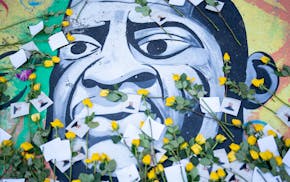
Five years later, Minneapolis remembers George Floyd
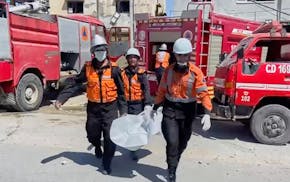
Israel's latest strikes in Gaza kill 38 people including children
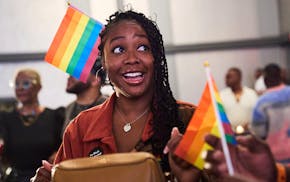
In an uneasy climate, diverse pride groups converge on DC with differing interests but common goals
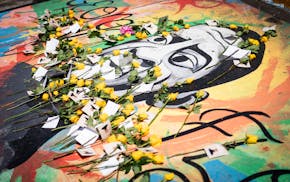
How the Minnesota Star Tribune covered the five-year anniversary of George Floyd's murder
